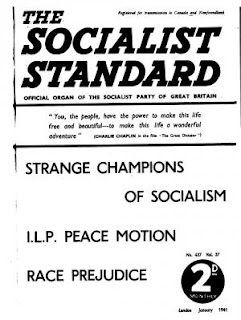Constant appeals are being made to us for war savings. We are asked to save to the limit. Sir Robert Kindersley says : —
“Pennies, sixpences, shillings, pounds—all are needed to reach the goal. Let us hold nothing back that we can spare. And when I say “spare,” I mean by saving to the point of sacrifice.”—(Sunday Express, November 17th, 1940.)
When we read these words addressed to workers we wonder if people in the economically sheltered position of Sir Robert Kindersley have any real conception of the workers’ position and social circumstances. The workers are always saving to the point of sacrifice if they have a penny over at the end of the week after paying for absolute necessities, which include some minor means of enjoyment. In fact, they have to go without many things that are really necessities because they have not the money to pay for them, and they suffer accordingly.
When one compares appeals like that with contemporary actions, one is struck by the overwhelming influence of private property and profit making on the actions of people even at a time of self-confessed dire national crisis. The very same paper that reports the above appeal also has a few paragraphs on ”Ramp in Leeks,” from which it appears that on account of the onion shortage a ramp in leeks is starting, and four-pence worth of leeks now costs three shillings !
A further illustration of the evil influence of money is provided by an instance that has been brought to the writer’s notice. Although all London traffic is under the control of the London Passenger Transport Board, which appeals to the public to stagger hours and do what they can to ease the transport difficulties, yet a person holding an underground season ticket from Baker Street to the Bank may not use the alternative service of the buses unless the underground is out of action—because he has paid for a ticket on the underground. If he goes by bus he must pay again. One sees here how, even under the fiction of public control, and even though the buses be nearly empty and the underground packed to suffocation, people are still only allowed to use the particular service they paid for. Sacrifice does not enter into the question, money is the all-important guiding principle.
Again women and children of the poor are urged to evacuate from London to areas where they are less likely to suffer the horrors of bombing. Among the reasons that prevent them from going some women have pointed out that one of the principal obstacles is providing the necessary warm clothing and boots required by children in country districts. A magnanimous government has informed them that they can be supplied with these necessities, and instead of paying for them all at once, payment can be spread over a few weeks—like the hire purchase arrangements with which the poor are only too familiar. As these people cannot even afford to adopt such a procedure it has not apparently occurred to the authorities that the solution of the problem is to supply the article in question for nothing—a simple and reasonable way out of the difficulty. Why ? Because the idea of giving something for nothing is repugnant to the system we live in to-day—unless that something is profit.
Another instance which appears in the same paper (the Sunday Express), illustrating the chasm between poverty and riches, the privilege of having money and the penalty of being without, is contained in the report of the case of Captain Marenday, imprisoned for taking an unauthorised photograph. In his story Captain Marenday made the following statement: —
“Later they put me in a bay of the prison (Brixton) and I was given the special privileges of a remand prisoner. All of us there were able to order our own food from restaurants outside. Always providing we were ready to pay for it.”
So that privilege even extends to prison, and the remanded rich man can eat luxuriously while the remanded poor must keep to prison fare. A queer twist to the idea of freedom and democracy and one born out of the power of money.
Gilmac.

No comments:
Post a Comment